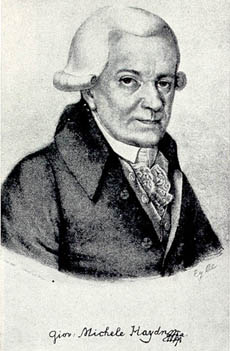

Composer. Brother of Franz Joseph. Around 1745 he went to Vienna as chorister at St. Stephen's, where he also learned violin, clavier, and counterpoint through the use of Fux's Gradus ad Parnassum. Like his older brother Joseph before him, when his voice broke he remained in Vienna for several lean years; this period ended in 1757, when he received a post at the court of the Bishop of Grosswardein (now northern Romania). In 1763 he assumed duties as Konzertmeister to Archbishop Schrattenbach in Salzburg; in 1768 he married a singer in the court chapel there, Maria Lipp. In Salzburg Haydn held several important organ posts, including that at the Dreifaltigkeitskirche (from 1777), and as Mozart's successor as court and cathedral organist. He remained in the latter position for the rest of his life, despite the death of Schrattenbach in 1771. From 1787 he was violin instructor for the court (succeeding Leopold Mozart), and after 1798 he visited Vienna several times. In 1800 Archbishop Colloredo was forced out of his position, a development that caused Haydn great financial hardship. Nevertheless, when he was offered (during his visit to his brother in Vienna and Eisenstadt in 1801-2) a post as Vice-Kapellmeister for the Esterházy court, he turned it down in favor of his position at Salzburg. In 1804 he was inducted into the Royal Swedish Academy of Music.
Michael Haydn composed more than 400 sacred works. He also composed stage works (Die Wahrheit der Natur 1769; Der englische Patriot, ca. 1779; Die Ährenleserin, 1788; incidental music to Voltaire's Zayre, 1777); oratorios (including a lost collaboration with W. A. Mozart and Adlgasser, Die Schuldigkeit des ersten Gebots; Der Kampf der Busse und Bekehrung, 1768; Oratorium de Passione Domini nostri Jesu Christi, ca. 1775) and cantatas (Ninfe in belli, 1765; Die Jubelfeyer 1787); some forty symphonies (Symphony in G, P 16, formerly attributed to Mozart as K. 444); concertos; divertimentos and other ensemble works (cassatios, serenades, etc.); chamber music (twelve string quartets, string sonatas).